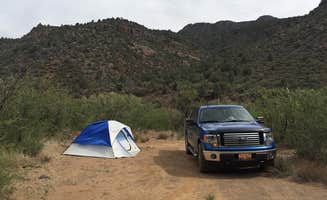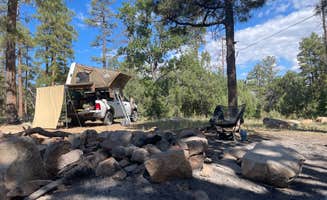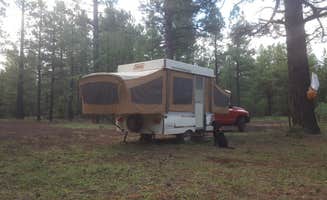Tent camping near Cibecue, Arizona requires navigation through White Mountain Apache tribal lands, where permits are mandatory for all visitors. Located at approximately 4,500 feet elevation, the area experiences temperature ranges from below freezing in winter months to over 100°F during summer days. Camping options span from established campgrounds with minimal amenities to completely undeveloped dispersed sites, with most locations sitting at the junction of desert and pine forest ecosystems.
What to do
Creek fishing access: At Airplane Flat Campground, campers can walk to nearby waters for recreational fishing. "Short walk to Lower Canyon Creek where the waters were icy cold. Great trout fishing - north of the bridge, catch and release only south of the bridge with barbless lures only," notes Gerard R.
Wildlife observation: The remote location of many camping areas provides excellent wildlife viewing opportunities. David Y. describes Forest Road 195 Campground as "pretty secluded and pretty remote. Sites are of different sizes, anyone can camp, big trailers etc. very quiet except for nature and birds."
Waterfall hiking: Several campgrounds serve as base camps for waterfall hikes in the region. According to Doug C., camping at Second Campground "makes for a relaxing night after a short hike to the falls," referring to the permit-required hike to Cibecue Falls.
What campers like
Privacy and seclusion: Many campers appreciate the remote, uncrowded nature of camping in this region. Emm S. describes Alderwood Campground as a "diamond in the rough" that was "a bit out of the way, but fairly easy to access. Exactly what we were looking for with much appreciated privacy and no one else around."
Natural water features: Access to creeks, springs, and waterholes ranks highly among camper preferences. "We went in July and it was upper 80's during the day, perfect at night for a fire. Short walk to Lower Canyon Creek where the waters were icy cold," reports one Airplane Flat visitor.
Disconnect from technology: The lack of connectivity creates a true wilderness experience. David Y. notes "no Verizon for the most part" at Forest Road 195, while Sonja T. cautions that "cell services leaving Payson for ATT/Cricket was NONEXISTENT for most of the way, especially up in the dispersed areas. Use offline maps, don't rely on internet access if you have Cricket!"
What you should know
Permit requirements: Most camping within Apache tribal lands requires specific permits purchased in advance. Camping at Salt River Canyon - Apache Tribe and other tribal sites requires proper authorization, with Susan W. noting that despite being "completely uncultivated," the area remains under tribal management.
Road conditions: Access roads to many camping areas are unpaved and can be challenging. Doug C. describes the road to Second Campground as "a dirt road with a cliff on one side," while Sonja T. warns that at Forest Road 195, "the roads off the main are VERY rough. In our Santa Cruz we had to go very slow and careful. Better suited for larger trucks with ample clearance."
Site availability: During peak seasons, finding available sites can be difficult without advance planning. "We tried this site but it was full in both sides of 195. Not a site to be found," reports one camper about a busy weekend at Forest Road 195 Campground.
Tips for camping with families
Choose established sites: For family camping, consider campgrounds with basic amenities. Andy K. notes that at Airplane Flat Campground, "the spots are spaced out decently" and Bryce R. adds there's "great area lots of room. There's a fish hatchery nearby."
Weather preparation: Temperature fluctuations require packing for multiple conditions. One camper reports sleeping through "a light rainstorm" at Alderwood Campground, while summer temperatures at higher elevations remain milder than surrounding lowlands.
Water activities: Several sites offer creek access for children to enjoy supervised water play. Gerard R. describes Airplane Flat's creek access as having "icy cold" waters, perfect for cooling off during warmer months.
Tips from RVers
Site selection for larger vehicles: Not all campgrounds accommodate larger RVs. David Y. notes that at Forest Road 195, "sites are of different sizes, anyone can camp, big trailers etc.," making it suitable for various vehicle sizes.
Limited hookups: No campgrounds in the immediate Cibecue area provide water, electric, or sewer connections. RVers must be fully self-contained with adequate water, propane, and waste storage capacity for the duration of their stay.
Road clearance considerations: High-clearance vehicles are strongly recommended for accessing most campgrounds. Sonja T. explains that Forest Road 195 has roads that are "VERY rough. In our Santa Cruz we had to go very slow and careful. Better suited for larger trucks with ample clearance."






